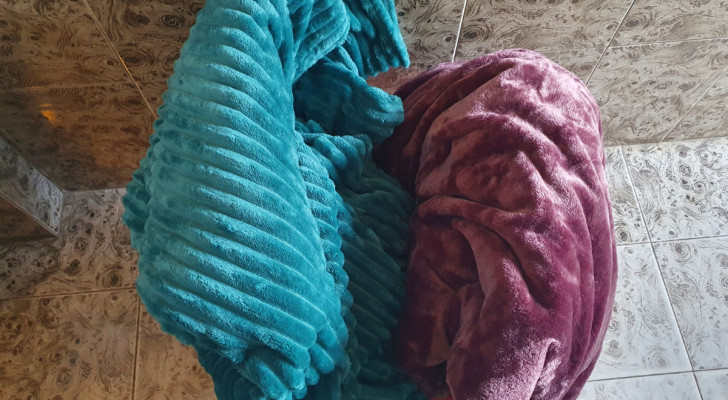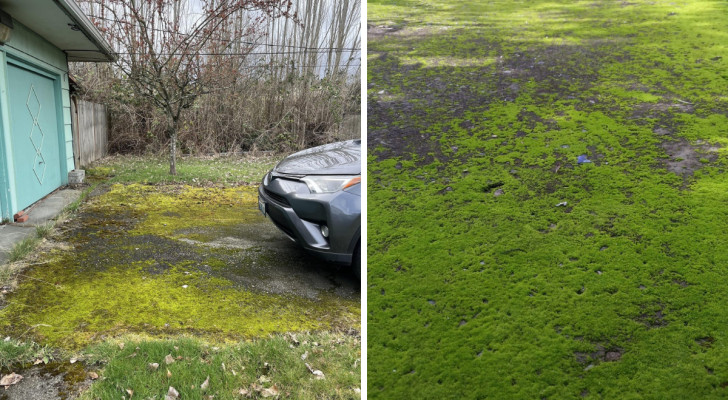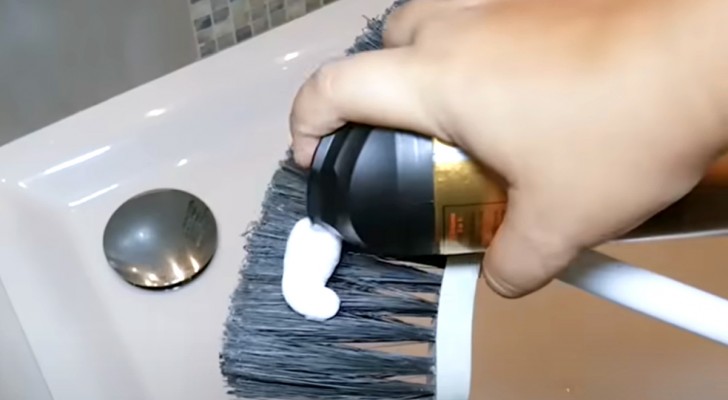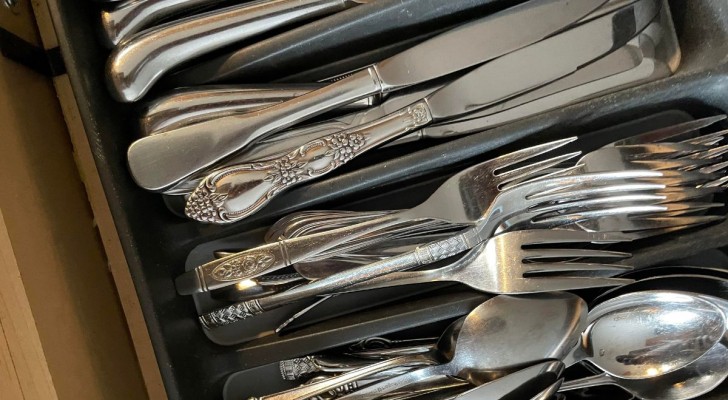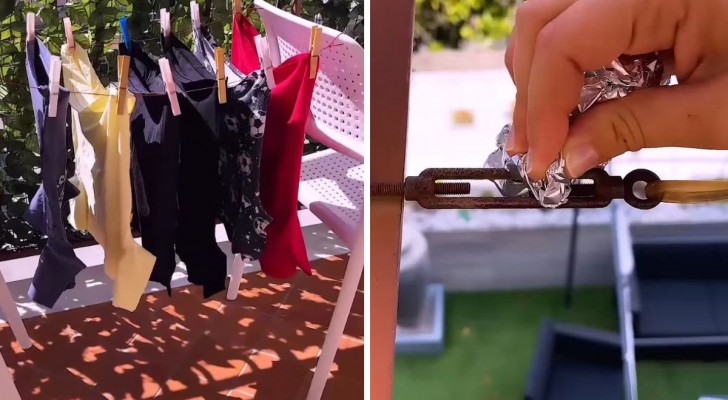Using vinegar in house cleaning: let's see in which situations it is useful and in which it is to be avoided
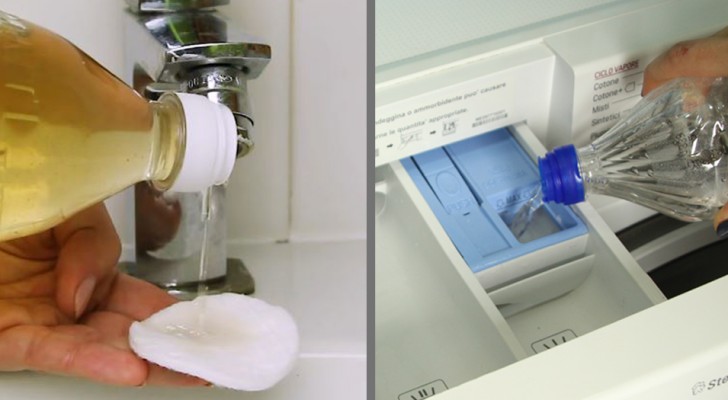
White vinegar (wine or apple) is certainly one of the cooking ingredients that is most often used to carry out many household chores: its acid component, in fact, is very useful for dissolving and removing stubborn dirt stains on many surfaces and to eliminate encrustations or traces of limescale that I know can form in the bathroom, in the kitchen or maybe even on the glass of windows, mirrors and more.
The same acidity, however, can ruin the finish of several other surfaces or be too corrosive for some types of pipes in the long run. For this reason, it is good to remember in which situations it is possible to use vinegar as an ally in cleaning and when it should be avoided.
When to use it
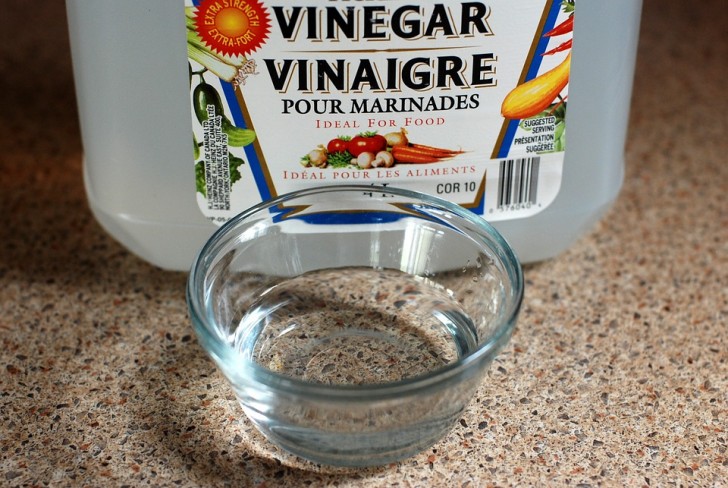
For laundry and washing machine cleaning
Adding a little vinegar to the laundry is a way to neutralise bad odours. Contrary to what one might think, in fact, the pungent smell of vinegar does not remain on the fabrics, and indeed when we wash clothes used for sports activities or clothes that had become impregnated with the smell of smoke, a little vinegar added to the drum or in the detergent compartment (half a glass is sufficient, but always pay attention to the fabrics to be washed, making sure that they can come into contact with the vinegar) is the economical solution to try.
The vinegar also helps to soften garments: the acidity of the vinegar is sufficient to dissolve the residues of alkaline soap (i.e. most of the laundry detergents) that accumulate between the fibers of the fabrics, especially when it is exceeded with the amount of detergent, a practice to avoid. The fabric, therefore, is softer to the touch. Maybe not for every wash cycle, but every now and then, when you notice that clothes or household linen seem to come out a little too stiff from the washing machine, you can add half a glass of vinegar. Or, you can dilute 250 ml of vinegar in 3 liters of water and soak the clothes for an hour before washing.
If you want to use it to make whites brighter, mix 130ml of vinegar, 130ml of lemon juice and 1 tablespoon of borax: you can use this mix in the washing machine (even directly in the drum) or dissolve it in 3 liters of water and immerse the laundry for an hour before washing it.
If you occasionally add 130ml of vinegar to the detergent tray, the vinegar will make the colours of the fabrics more vivid.
The vinegar also cleans the washing machine itself. We use it frequently, and it comes into contact with dirt, bacteria, soap residues. Occasionally, therefore, in addition to cleaning the filter, remember to also wash the detergent compartment and the basket itself: you can remove the filter and leave it to soak in water with a little vinegar (and in this way you will also remove limescale), and then fill a basin with hot water and a half cup of vinegar, using the mixture with a microfiber cloth to wash the basin.
Furthermore, once every few months, start an empty wash by inserting 250 ml of vinegar in the tray and selecting a short cycle at 50 ° temperature.
If you then notice that mould has formed in the door seal, which often causes unpleasant odors even in the laundry, take a microfiber cloth, wet it with vinegar and wipe it between the folds of the seal, then sprinkle them with a spoon of baking soda, let it act and rinse with the wet cloth. You can also avoid rinsing and instead proceed to vacuum washing with vinegar as just indicated. Then remember to always keep the door open for at least half an hour after you remove the laundry, so as to avoid the formation of mold in the future.
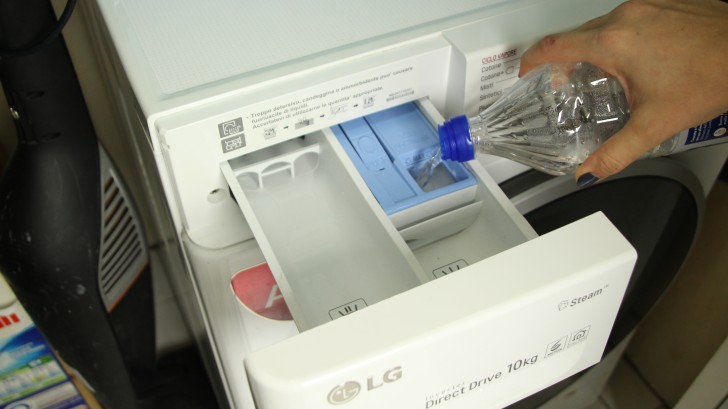
Creativo
Stoves and the hob
If you have a ceramic hob, you can take care of its ordinary cleaning with vinegar. Always wait until it is very cold, then fill a spray bottle with vinegar and spray it on the surface, rubbing with a microfiber cloth moistened with water and then rinsing with another. You will be able to degrease and avoid unpleasant halos.
If, on the other hand, there are more persistent incrustations, after spraying the vinegar sprinkle the stains with a few spoonfuls of sodium bicarbonate, a foam will be produced by reaction, which you will have to leave for a few minutes. Then wet a cloth or cloth with hot water, squeeze a little and place it on the hob for 15 minutes.
There are also those who use kitchen paper (a slightly less ecological choice), leaving it soaked in vinegar on the stains, and covering it with kitchen wrap for about 30 minutes. After this period of time, remove everything with a sponge and finish cleaning again using a soft cloth and vinegar. After rinsing, always remember to always dry, to avoid even the slightest traces of limescale.
Vinegar is also an excellent ally for cleaning the various parts of the gas stove: fill a basin with hot water, pour in 2 glasses of vinegar and 2 tablespoons of salt, stir to make it dissolve well. Then wet a soft sponge in the mixture and rub it on the metal shelf. It is a valid alternative to stove cleaners. If there are hard deposits, sprinkle a little salt on the sponge to make it more abrasive and then insist by rubbing on stubborn dirt.
If you want to clean the burners or degrease the grids, fill a pot (or, for grills, a basin large enough to contain them) with boiling water, and then pour in one or more glasses of vinegar (if you want, you can also add baking soda ). Leave to soak for an hour and then create a batter by mixing baking soda and vinegar, to scrub the various parts with the help of a toothbrush and a sponge.
Windows and mirrors
Whether it's a window, a bathroom mirror or a shower stall, the glass in the house always ends up getting dirty with a few spots, especially when drops of water dry on the surface, leaving a trace of limescale. To eliminate these annoying halos and streaks you can use vinegar.
Then dilute 100 ml of vinegar in 300 ml of hot water and fill a spray bottle with the mixture. You can spray directly on the glass to be cleaned, but generally it is advisable to wet a soft (microfibre) and well-cleaned cloth, and then rub the glass with this.
You will feel the pungent smell of vinegar for a while, but if you still want to avoid it, you can add a few drops of an essential oil of your choice, without overdoing it.
When to avoid using it
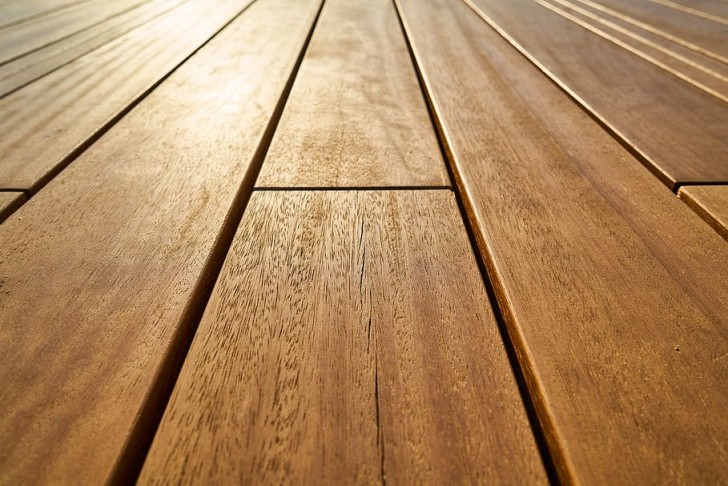
- On wooden surfaces with a waxed finish, including parquet. In these cases, the acidity of the vinegar ends up eroding the waxed finish, creating more damage than anything else. It is therefore better to use suitable alkaline soaps.
- Marble or granite: vinegar can be too aggressive on these surfaces, dulling the shiny and smooth surface. The abrasion caused by the vinegar in fact makes these surfaces more porous, thus making them more prone to retain dirt, therefore increasingly difficult to sanitize. Better to use warm water with a few drops of dish soap and a teaspoon of ethyl alcohol.
- Natural stone floors: aggressive and highly acidic substances such as vinegar, ammonia or lemon affect the surface of the stone, dulling the finish and ruining its appearance, as well as making it increasingly difficult to clean them sequentially. Not to mention that restoring the original state of these floors becomes very expensive.
- When eggs fall on the ground or on the work surface, do not clean with vinegar. It would seem the best solution to degrease and remove all traces of odour that could arise from egg residues left on the surface but in reality the vinegar causes the egg to coagulate, making it more difficult to remove. Warm soapy water works best.
- Never mix vinegar with bleach or hydrogen peroxide: the interaction of these substances, in fact, releases toxic gases that are harmful to health.
- On pearls: among the components of pearls there is calcium carbonate, which tends to dissolve in contact with vinegar. So don't use it if you plan to make your jewels shine again. Instead, it is better to dip a soft cloth in a solution of hot water in which you have dissolved a few drops of mild dish detergent, or even some Marseille soap.
Never miss a few bottles of white vinegar to take care of your cleaning, but remember that it is not always the best solution.

